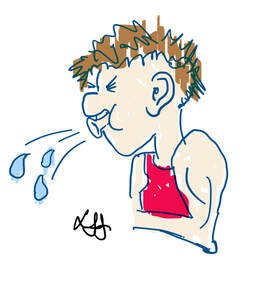It might feel like a trivial act—spitting in anger or frustration—but legally it can be far from harmless. In many places, spitting on someone is treated as assault or battery, with real consequences. This article explains why spitting on someone is assault, how the law treats it across jurisdictions, and what both victims and accused individuals should know.
What Counts as Assault—and Where Spitting Fits In
To understand whether spitting qualifies as assault, we first need to grasp what assault and battery mean under the law.
What Is Assault?
In most legal systems, assault involves an intentional act that makes another person fear imminent harmful or offensive contact. It doesn’t always require physical injury. For example, threatening to punch someone or raising a fist may count.
What Is Battery?
By contrast, battery refers to actual physical contact—intentional and without consent—that is harmful or offensive. Even minimal contact, such as spitting, may qualify if the courts deem it “offensive touching.”
Why Spitting Can Be Assault
Spitting is intentional and directed; when it lands or is threatened, it crosses into the realm of unwanted physical contact. The key legal point: offensive touching doesn’t need to cause visible injury to be considered battery or assault.
Why Spitting on Someone Is Often Assault
Intentional Contact and Offense
Spitting shows an intent to demean or offend. When spit touches another person, the law can view it as offensive physical contact—hence assault or battery.
Health Risk Factor
There is a real health risk behind spitting. Saliva can carry pathogens, and courts have recognized that even if no disease is transmitted, the potential alone elevates the seriousness of the act. For example, intentionally spitting in another person’s face easily falls within the scope of an offensive touching.
Legal and Social Disrespect
Spitting is widely seen as a degrading act—an insult layered with intent. Many legal systems treat such conduct not just as rude but as assaultive behavior because it undermines personal dignity and safety.
Laws Around the Globe: Is Spitting on Someone a Crime Everywhere?
The legal treatment of spitting varies by jurisdiction—but many places recognize it as assault or battery.
United States
| State/Region | Classification of Spitting | Possible Penalties |
| General U.S. law | Assault/battery with offensive contact | Misdemeanor jail time, fines |
| Texas | Simple assault if saliva contacts victim; higher penalties for public officials or infectious risk | |
| California | Spitting toward or on someone can be simple assault or battery |
UK, Canada & Australia
In the UK, spitting on someone may amount to common assault since it involves unwanted contact. Australia has cases where spitting on a police officer was charged as serious assault.
Why Differences Matter
Factors such as the victim’s status (e.g., law enforcement, elderly), the context (public vs private), and disease risk can elevate the charge to a felony or aggravated assault.
Assault vs Battery: How Spitting Fits In
Assault vs Battery Defined
- Assault: Threat or apparent attempt of unwanted contact
- Battery: Actual unwanted contact
Spitting as Battery—and Sometimes Assault
Even if no injury results, spitting involves intentional contact: that’s battery. If someone threatened to spit and the victim feared contact, it may be assault.
Real-Life Examples
- Spitting during an argument leads to battery.
- Spitting at a victim but missing may still count as assault.
- Spitting on an officer carries higher penalties (often felony-level).
Consequences of Spitting on Someone
Criminal Penalties
Penalties range widely depending on location and circumstances:
- Jail time (up to 1 year in many U.S. misdemeanors)
- Higher fines and longer sentences if the victim was a public official or the act included disease transmission risk
- In some states, simple assault for spitting can lead to up to 6 months in jail and $1,000 in fines
Civil Liability
Even without criminal charges, the victim can file a civil lawsuit for battery or emotional distress.
Life Impacts
Conviction can result in a criminal record, difficulty obtaining jobs or housing, and long-term reputational damage.
What to Do If Someone Spits on You
Here’s a practical checklist if you’re the victim:
- Stay safe and avoid retaliation
- Document the incident: date, time, video, witnesses
- Report to the police with clear intent and contact noted
- Seek medical attention if saliva enters nose, eyes or mouth
- Consult a lawyer about criminal charges and possible civil action
What to Do If You’re Accused of Spitting on Someone
If you face charges:
- Don’t admit guilt or make statements without legal counsel
- Contact an experienced criminal defense attorney immediately
- Possible defenses: no intent to harm, accidental act, lack of actual contact
- Understand that assault and battery laws vary by state and penalties escalate with aggravating factors
Real-Life Case Studies
| Case | Incident | Outcome |
| United States v. Lewellyn | Defendant spat in the face of a prison officer | Federal conviction for assault under U.S. statute |
| Melbourne Rail Assault | Homeless man spat on a female conductor | Treated as assault in Australian court |
| Washington D.C. Case | Woman spat on U.S. Attorney during interview | Pleaded guilty to assault charges |
These show how even a seemingly “minor” act of spitting triggers serious legal consequences.
Why Spitting Is Taken So Seriously
A Public Health Concern
Spitting can transmit infectious diseases and involves bodily fluids—courts treat it as more than merely rude.
An Intentional Disrespectful Act
The law recognizes the emotional and societal impact of being spat on. It’s a form of aggression and humiliation.
Legal Deterrence
Strong penalties act as deterrents because spitting can escalate into more violent encounters.
Preventing Spitting Incidents & De-escalating Conflict
- Stay calm and avoid escalation if provoked
- Use de-escalation techniques: walk away, record from a safe distance, involve authorities if necessary
- Educate about the legal risks of spitting as a form of assault
- In public service or healthcare settings, train staff on how to respond safely to spitting incidents
FAQs: Is Spitting on Someone Assault?
Q1: Is spitting on someone assault or battery?
A: It can be both. Spitting often counts as battery (physical contact) and may also meet the definition of assault if it caused fear of contact.
Q2: Can I go to jail for spitting on someone?
A: Yes. Many states classify it as misdemeanor assault or battery. Penalties can include jail time and fines.
Q3: Does it matter if the spit didn’t touch the person?
A: In some jurisdictions, yes. Spitting toward someone may still be assault based on fear of contact.
Q4: What if it was an accident?
A: Without intent to contact the person, it may not qualify as assault or battery. For instance, spitting unintentionally due to a cough may not meet the legal threshold.
Key Takeaways
- Spitting on someone can qualify as assault or battery in many legal systems
- It doesn’t require injury—intent and contact matter most
- Penalties vary but can include jail time, substantial fines, and civil liability
- Both victims and the accused should act accordingly: document or seek legal counsel
Final Thoughts: Respect, Law, and Responsibility
Spitting may seem like a momentary burst of anger, but in the eyes of the law, it’s often far more. It’s an offensive act—both physically and emotionally—that courts treat seriously.
Understanding the legal implications helps you both protect yourself and avoid crossing the line. In short: think before you spit—because the law often does.













Leave a Reply